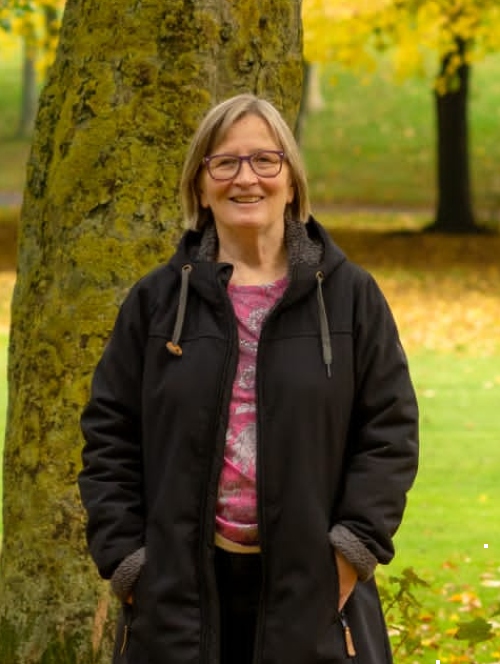
Sr. Rita Wynne of the Religious Sisters of Charity (Courtesy of Rita Wynne)
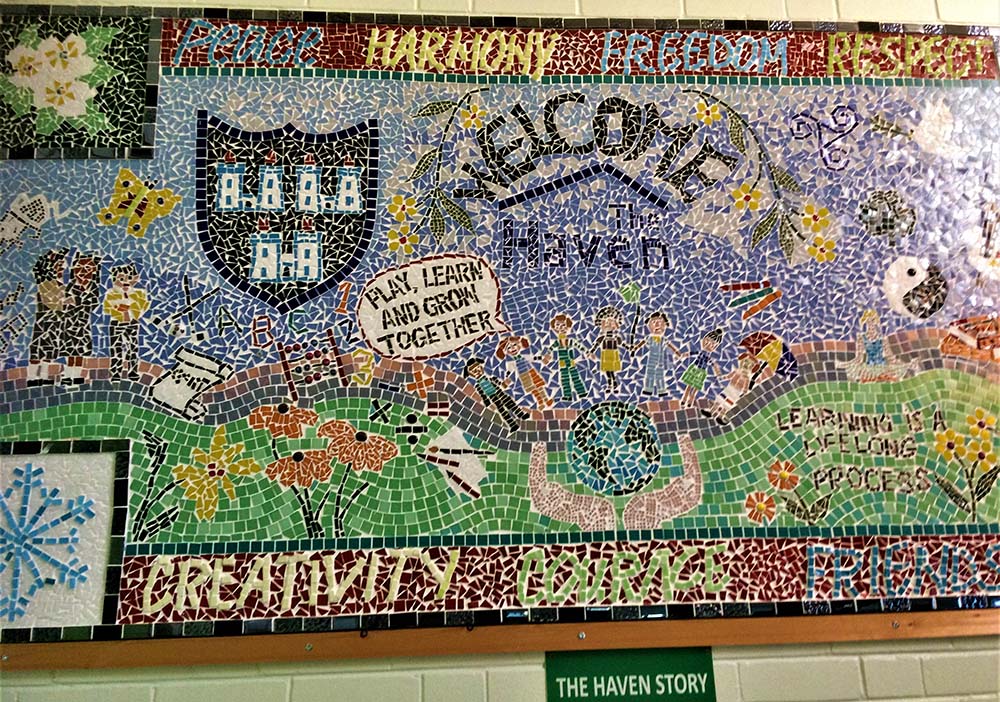
A mosaic of the history of the project in the entrance to the Haven Adult Education Centre in Dublin (Courtesy of Rita Wynne)
"You can't be so heavenly as to be no earthly use," 64-year-old Sr. Rita Wynne is apt to say.
A Religious Sister of Charity for 42 years, Wynne trained as a primary school teacher and taught in a number of schools run by her community in Ireland. She received her master's degree in women's studies at University College Dublin and was appointed principal of Mater Dei Primary School in Dublin's inner city in 1996. There, she saw firsthand Ireland's growing cultural and ethnic diversity from the late 1990s onward.
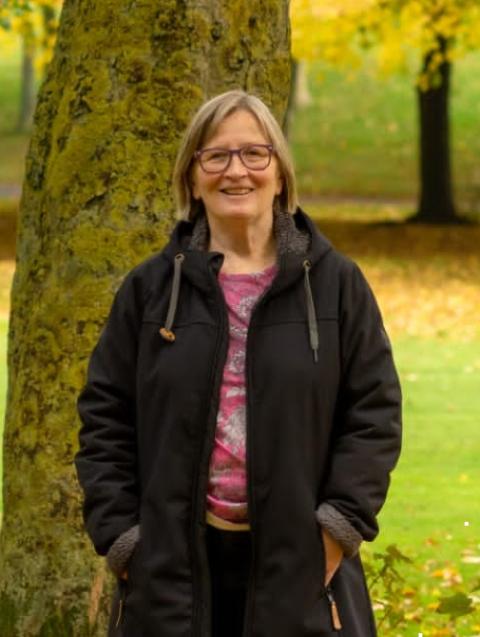
Sr. Rita Wynne of the Religious Sisters of Charity (Courtesy of Rita Wynne)
In 2008, to mark the 150th anniversary of the death of Venerable Mary Aikenhead, foundress of the Religious Sisters of Charity, Wynne oversaw the opening of the Haven Adult Education Centre in Basin Lane, Dublin. The not-for-profit center's purpose is to create educational opportunities for adults who, for one reason or another, were unable to benefit from educational opportunities at second level. The center aims to build up their confidence and develop their skills through courses and support services.
The Haven is surrounded by apartment complexes. This inner-city area has few green spaces, and most local residents do not have gardens of their own. So Wynne created a small garden in a disused courtyard area of the Haven Centre to give local residents a "little bit of heaven" and provide those who undertake the Haven's gardening course with a place to apply some of the skills they have learned. The opening of the garden in 2015 marked the bicentenary of Aikenhead's founding of the Religious Sisters of Charity in 1815.
GSR: When did you discover you had a vocation to religious life?
Wynne: I am the second eldest of eight. I had a fair amount of responsibility at home and helped out within the family.
At school in Holy Faith Glasnevin in the 1960s, the classes were huge, up to 54 girls in a class. There weren't any resource teachers. If a girl needed a bit of help and she wasn't getting it, I was willing to help her in the library after school.
This willingness to help was a strong feature in my life. I joined the Society of St. Vincent de Paul in my final year at school, and I was also involved with an organization called JOY, which stood for "Jesus, Others and Yourself." It helped people with special needs.
The draw to religious life slowly came to a head. We had no history in our family of people in religious life, so this was something new. When I mentioned it, my father said he would prefer if I worked for a while before I joined a religious order. I worked in a shipping company and then I worked for Dublin City Libraries, which I really enjoyed. I was actually selected to go to university to study librarianship, but that never happened because I felt pulled toward religious life.
Advertisement
Why did you decide to join the Religious Sisters of Charity?
I went to school with the Holy Faith, but I entered the Religious Sisters of Charity, whom I had no knowledge of. I did not know where I was drawn to. I got out the Yellow Pages and looked up active orders. I literally closed my eyes and decided I would visit the first five that a pin landed on. In each case, I got a very good welcome.
The Religious Sisters of Charity in Ireland are well-known because of their hospitals, like St. Vincent's in Dublin and their hospice in Harold's Cross, as well as Sr. Stanislaus Kennedy's work with people experiencing homelessness. Where did your vocation lead you?
After completing novitiate, I was asked to go to Carysfort College in Blackrock, County Dublin, to do primary school teaching. I taught in several schools, the last of which was Basin Lane in Dublin from 1996 until 2011. We are a very small order, but people have often thought we were larger because the congregation was involved in so many things. Our small size meant we always worked closely alongside lay colleagues.
Basin Lane is in the heart of inner-city Dublin. The school is designated as a DEIS Band 1, indicating that the level of disadvantage is greatest. For the 15 years I was there, we were always battling with the Department of Education to get the children the resources they needed, such as psychological assessments.
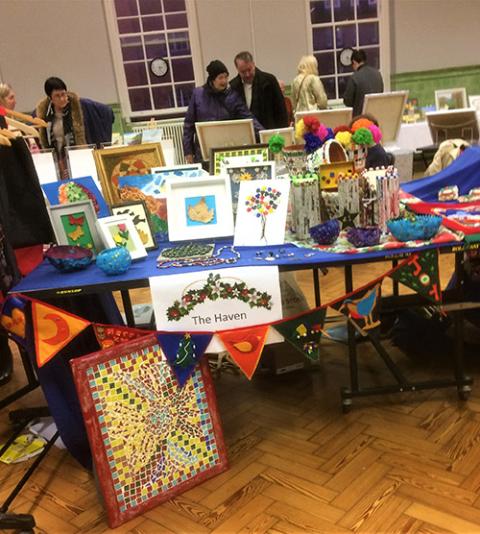
Some of the art and crafts produced by students at the Haven Adult Education Centre in Dublin on sale (Courtesy of Rita Wynne)
I got the school involved in the Junior Achievement Program, which brought people from the worlds of business, IT, banking, etc. into the school. It gave the children an opportunity to learn about possible future work. In an area of very high unemployment, their exposure to working life was extremely limited. The school had children from very disadvantaged backgrounds who are coming from a legacy of unemployment and were grappling with the impact of the drug culture. Crime levels in the area were high.
In more recent years, the parents of some of the children coming to the school were staff employed at St. James's Hospital, which is close by. So we had a large Indian and Filipino contingency, as well as children from the Congo, Somalia, Ethiopia and the Roma — a huge mix. They brought an enrichment to the school.
A lot of the parents did not have any English. So one of our sisters, who had come home from Zambia, offered to help parents learn English. She also got involved with helping families to find housing and dealt with the various housing agencies.
Did this outreach to parents lay the seed for adult education at the Haven Centre?
It was a mixture of things. The facilities, which had been used for secondary students, became vacant. They were leased by a youth project, but that brought many challenges, as many of those attending the project were very disturbed, and lots of syringes were being left around.
When the lease was up, I asked the congregation if I could have the building. It had to be completely refurbished; I secured funding through Dublin City Council, the congregation, General Electric and some smaller donations.
The English classes began with two tutors; I was still working in the primary school.
Then, in 2011, I was asked to go on the congregation's leadership team until 2017, which meant giving up my role in the primary school. While I was on the leadership team, I continued to work on the Haven project to keep it going and develop it.
We used to have an English class just one morning a week. One of our own sisters taught Muslim women. We got another teacher through the Education & Training Boards.
With class sizes restricted to 12, we were turning so many away, and so our waiting list for beginners English grew. Those that finished the beginner level wanted to continue their lessons to a higher level with us.
After three years talking about funding to the ETB, we are now able to hold English classes four days a week, from beginners to level four, and we have 11 tutors.
The Haven also runs parenting and computer courses for people starting from scratch. We provide classes in gardening, flower arranging, arts and crafts, relaxation and personal development. Occasionally, we provide courses in things like first aid or cookery and nutrition.
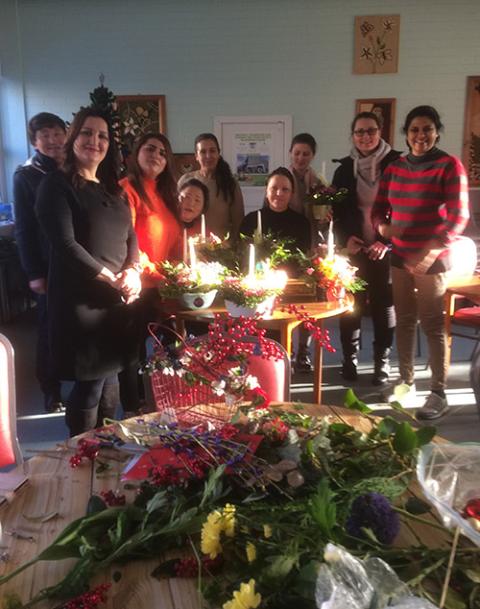
Students of the Haven Adult Education Centre in Dublin during a flower-arranging class (Courtesy of Rita Wynne)
We have a preschool that costs just 5 euros an hour unless the child has an [Early Childhood Care and Education Programme] place, which is free. The low rate is there to help struggling families and those working long shifts in the hospital.
As a not-for-profit organization, the Haven is run on an informal, friendly basis. There are no layers of management. I am the general factotum, and I also make sure that there is enough money to continue running the place. I look for grants and donations.
The COVID-19 pandemic meant classes had to be suspended from January until April this year, but we are looking forward to a full return from the week beginning Sept. 6. I aim to restrict the schedule of classes from Monday to Thursday so that I can have Fridays free for grant applications/networking and the other work I do for the congregation.
One of those roles is vocations director for the Religious Sisters of Charity in Ireland. What are the challenges?
As you probably realize, there are very few in this part of the world thinking of joining religious life. Those who are contemplating it are generally a good deal older. I've been in this role since 2011, and nobody has joined us during those years. I have had people coming and going, but I find that sometimes, those I'm in contact with are just lost. They can't find somebody willing to share faith with them in some way.
There are pockets of very committed young people. I did have two young women in their late 20s that I was journeying with, but they both joined enclosed orders.
How has Venerable Mary Aikenhead inspired you in your journey?
What struck me most was her aim to improve the lives of the poor. She wanted her sisters to have hands and heart that combined — and a good dose of common sense. She was brave and coped with bad health for years.
Mary Aikenhead died in this very house here in Harold's Cross, where I am living. We have a Heritage Centre dedicated to her and several little artifacts of hers. This is well worth a visit.
The Irish province has about 120 sisters, a lot of whom would be in their 70s, 80s and 90s. The sisters who are still active are involved in work with unaccompanied minors, anti-trafficking, parishes and faith programs, prison visitation and chaplaincy, and education as trustees or helping in a voluntary capacity.
At the moment, the lifeblood of the congregation is in Africa. We have a novitiate in Zambia, and the novices are from Nigeria and Zambia.







